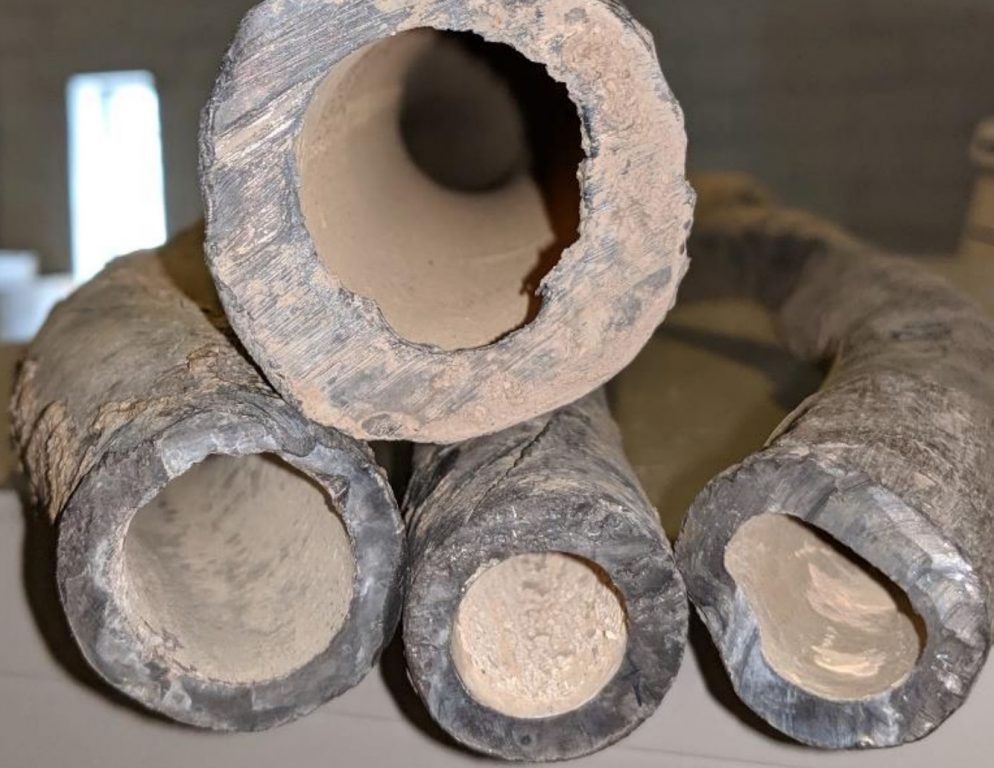Clean Drinking Water Effort Falls Short
$40 million state funding to replace lead laterals cut from budget by Republicans.

Lead service lines replaced by the Milwaukee Water Works with corrosion control visible in pipe. Image from Milwaukee Water Works.
Although Gov. Tony Evers declared 2019 the year of clean drinking water in Wisconsin in his 2019-21 budget veto message, that ambition won’t be easily realized. More than $32.65 million is allocated in the budget to improve water quality throughout the Badger State. Evers proposed another $40 million to help kickstart the process of replacing Wisconsin’s 200,000 lead service lines. Some 77,000 of those, Shepherd Express reports, are in Milwaukee.
Mentioning in his veto message that two-thirds of Wisconsin residents use groundwater for drinking, Evers noted, “these investments are important.” The governor does warn, however, “they do not go far enough to address the serious issues impacting our communities.” During his two terms in office, Gov. Scott Walker cut funding for water protections statewide.
Rep. Evan Goyke (D-18th) described the $40 million as “a historic investment from the state-level,” to the Wisconsin Examiner. “That was also then eliminated by Republicans shortly after it was introduced.” Rep. John Nygren (R-89th), said sending the majority of lead replacement funding to Milwaukee County was unfair “from a taxpayer’s standpoint.”
Goyke said the GOP is “wrong to single out Milwaukee as the only municipality which is struggling to remedy this issue. Milwaukee alderman Michael Murphy also called Nygren’s comments, and others made by Assembly Speaker Robin Vos, “petty and short-sighted.”
According to a 2016 WDHS report, “while lead poisoning is a risk statewide, significantly higher rates are seen in certain communities or parts of communities with higher prevalence of older housing.” The cities of Milwaukee, Watertown and Racine were among the top 10 jurisdictions with the highest rates of lead poisoning. “The rates of lead poisoning among children tested in these jurisdictions range from 5.1 percent to 10.8 percent,” the report states. These are higher than the statewide average of 5.0 percent.
The U.S. Environmental Protection Agency and Centers for Disease Control and Prevention agree that “there is no known safe level of lead in a child’s blood.” Studies on childhood lead exposure have noted negative behavior changes, “especially social withdrawal, depression, and atypical body movements, aggression, and destruction,” according PubMed.
Public pressure on cities to examine their entire infrastructure to determine the source of lead poisoning has increased in recent years. Milwaukee’s school district even conducted an analysis in 2016 finding, “there are no lead service lines leading from the City of Milwaukee’s water service into MPS school buildings.” Nevertheless six percent or 183 of the districts 3,000 water fountains, had “levels above EPA standards.”
Students at North Division High School in 2016 organized a protest soon after learning their school had some of the highest levels. That year, 42 percent of the school’s 258 water fixtures exceeded the EPA’s standard of 15 parts per billion for lead, Milwaukee Journal Sentinel reports. Student activists also claimed a water bottle-filling station available only to staff used filtered water; an accusation school officials denied.
Despite the Flint fallout spreading nationwide, Walker continued cutting funding related to water management. Page 53 of his 2017-19 veto message called for agencies involved in the “production, transmission, delivery or furnishing of water,” to the public to not be defined as public utilities. The 2015-17 budget also cut $54.1 million from the clean water fund, and $40,4600,000 the following period from 2017-19. In 2016, Walker was criticized for receiving $750,000 in personal and corporate checks from Harold Simmons. The Texas billionaire, Huffpost reports, owns NL Industries, a decades-old producer of lead paint products.
Evers appears to be taking a very different approach. In March 2018, then-candidate Evers released a video announcing the “Safe Water, Safe Kids” plan. It aims to establish a loan program for replacing lead pipes, allow school districts and cities to exceed levy limits, assist children affected by lead poisoning, and other policies.
The budget war being waged by Republicans meant to slow this progress, Goyke says, is largely political: “I think it’s, sadly, a pretty effective political refrain to blame Milwaukee, or blame liberals in Madison and Milwaukee for the problems of small town, rural Wisconsin.”
Reprinted with permission of Wisconsin Examiner.
More about the Lead Crisis
- City Receives $400,000 Grant For Lead Screening - Sophie Bolich - Feb 24th, 2026
- Rep. Madison Proposes Restoring Local Control Over Lead Inspections - State Rep. Darrin Madison - Jan 6th, 2026
- $43 Million Later, MPS Says Classrooms Are Safe From Lead Dust - Corrinne Hess - Dec 18th, 2025
- MPS Buildings Cleared of Lead-Paint Risks after 10-Plus Months of Work - Milwaukee Public Schools - Dec 17th, 2025
- Wisconsin Moves to Require Lead Service Lines Replaced By 2037 - Danielle Kaeding - Dec 11th, 2025
- Gov. Evers, DNR Announce More Than $159 Million to Ensure Clean, Safe Drinking Water for Wisconsinites in 29 Municipalities - Gov. Tony Evers - Dec 10th, 2025
- EPA Announces $3 Billion in New Funding for States to Reduce Lead in Drinking Water - U.S. Environmental Protection Agency - Nov 25th, 2025
- Wisconsin Communities Get $282 Million for Drinking Water Projects - Danielle Kaeding - Nov 19th, 2025
- MKE County: County Launches Lead Abatement Program - Graham Kilmer - Nov 9th, 2025
- Milwaukee County Launches Lead Remediation Program to Reduce Lead-Based Paint Hazards in Homes in Suburban Communities - David Crowley - Nov 5th, 2025
Read more about Lead Crisis here
Political Contributions Tracker
Displaying political contributions between people mentioned in this story. Learn more.





















